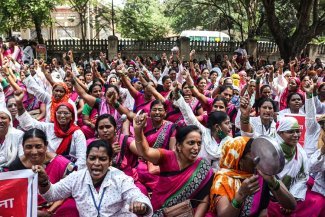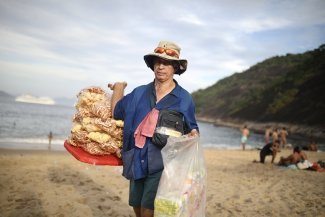Just over a year ago, in September 2015, the Workers’ Forum for Remembrance, Truth, Justice and Reparation composed of trade unions, human rights defenders and lawyers, filed a complaint with the Federal Public Ministry against Volkswagen (VW).
On the basis of documents found in the public archives of Sao Paulo State, the car manufacturer is accused by the organisation of having collaborated with the military police during the Brazilian dictatorship (1964-1986), by facilitating the arrest of at least 12 employees at its São Bernardo do Campo factory.
These workers were arbitrarily detained and tortured by the regime’s police. VW management is also accused of taking part in the drawing up of blacklists and spying on the activities of its own employees, before supplying this information to the secret police.
It is the first time that a company has been formally accused, and moreover by a civil society organisation, of collaborating with the dictatorial regime.
In the last few months a commission of inquiry from the federal prosecutor’s office, together with the Sao Paulo prosecutor’s office and the Federal Public Ministry, has been studying the case file put together by the Forum, containing 70 pages of evidence and legal argument, and has listened to the testimonies of former workers and victims, and of the accused, such as Colonel Adhemar Rudge.
This former army reservist was the head of the industrial security department at the São Bernardo Volkswagen factory from 1967 until 1991, well after the end of the dictatorship. He took over the post from Franz Paul Stangl, a former Nazi commandant from the Sobibor and Treblinka death camps, extradited to Germany and sentenced there. On 23 June 2016, Rudge, now a 90-year-old pensioner, was questioned by the examining magistrates and claimed that responsibility lay with his superiors.
Continuing the work of the National Truth Commission
This search for the truth about what happened under the dictatorship officially began in 2012 only. Former President Dilma Rousseff (who herself was imprisoned and tortured at the time) called for the creation of the National Truth Commission (CNV), to hold an inquiry into the fate of those who opposed the military regime. After two years of research, the commission published its final report.
Amongst the people and entities found to be responsible for crimes, the document devotes a chapter to companies guilty, directly or indirectly, of “serious human rights violations” such as imprisonment without legal grounds, sexual violence, torture, summary executions and forced disappearances.
In this chapter, Rosa Cardoso, a lawyer and member of the CNV, writes: “During this time, companies and the dictatorial state worked hand in hand, within and outside the factories, to prevent workers from organising and defending their rights”. The report speaks of the arrival of many former soldiers in the companies’ structures, not only at Volkswagen but also at other car manufacturers such as Ford and Mercedes.
One of the victims questioned by the commission of inquiry, which continued the work begun by the CNV, was former tool mechanic Lucio Antonio Bellentani, now aged 72. Secretly affiliated to the Communist Party at the time he worked for Volkswagen, he was arrested at work in 1972 by men from the Political and Social Order Department (DOPS), the arm of the dictatorship responsible for the repression of social movements.
“They pointed a machine gun at my back and handcuffed me in front of my colleagues,” he told the hearing. He was beaten on the factory premises, then detained at the DOPS for 46 days, without his family being given any information. “Torture was almost daily,” he said. During a later hearing Rudge denied that any arrests had taken place at the factory that he might have been complicit in.
João Batista da Rocha Lemos, a former employee at the factory, was also questioned. Still a member of the Brazilian Communist Party (PCdoB) he told the inquiry that he had been spied on by the security department following strikes that he took part in between 1977 and 1979. His name and address were on a “suspicious persons” list that Volkswagen sent at the time to DOPS.
He told the hearing that he was sacked by the company and for many years found it difficult to get work.
In an interview with Equal Times the coordinator of the Workers’ Forum, Sebastião Neto, explained that the aim of filing the case was to open civil proceedings to get the company to recognise its involvement and to pay towards collective reparation.
It would be very difficult to get a criminal conviction however owing to the amnesty law adopted at the end of the dictatorship which still protects the regime’s members and collaborators today.
The reparations demanded by the organisations would be used to finance educational and memorial programmes. “The private sector must be condemned for its collaboration with the coup d’Etat and the military regime. Volkswagen is just the first company concerned by this search for truth, justice and reparation. We intend to extend our action to other companies, and across the whole of Brazil.”
Prosecutor Pedro Antônio Machado, in charge of the case, already has many damning documents. Last July he sent a request to the headquarters of Volkswagen in Germany to draw up a list of Rudge’s superiors and to determine the level of involvement of the parent company.
“Volkswagen’s top management knew perfectly well that at the time Brazil was in a ‘state of emergency’ and that individual and trade union rights were greatly reduced under such laws,” explains Neto. The inquiry should also determine “any profits that Volkswagen may have made thanks to its complicity with the regime”.
At the end of 2015, Volkswagen sent a representative from Germany – Manfred Grieger from VW’s history department – on a special visit to Brazil to discuss the matter with Prosecutor Machado. Although the company is careful to say very little on the matter, it does seem prepared to apologise.
“Volkswagen regrets that people may have suffered during the military dictatorship, possibly owing to the participation of the directors of Volkswagen Brazil,” he stated.
The Public Ministry is due to conclude its investigations and decided whether to take legal action “by the end of 2016 or beginning of 2017,” according to Neto.









